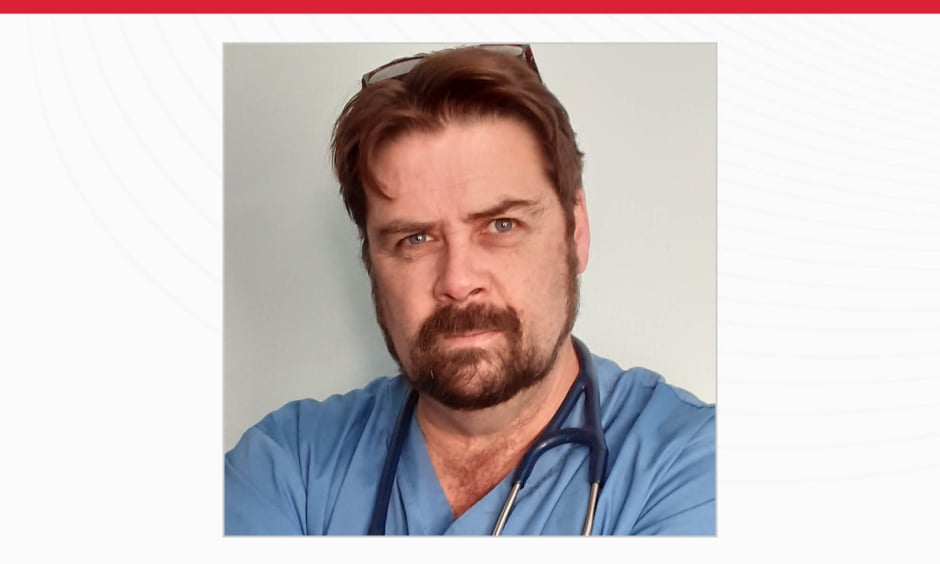David Oliver | NHS Consultant in Geriatrics and Acute General Medicine, Royal Berkshire NHS Foundation Trust, UK; Former President and Honorary Secretary, British Geriatrics Society; Former Clinical Vice-President, Royal College of Physicians; Former National Clinical Director for Older People (England), Department of Health; King’s Fund Fellow; Nuffield Trust Trustee, London, UK; British Medical Journal columnist; and freelance medical writer
![]()
David Oliver shared his thoughts with EMJ on his leadership and policy experience, his passion for advocacy in healthcare, and his work in bedside geriatric and internal medicine care.
What initially motivated you to specialise in the field of geriatrics?
In my first Senior House Officer job working in emergency medicine, I realised that I was happiest working in adult internal medicine. When I became a medical Senior House Officer studying for my MRCP and rotating through different disciplines, I had my best training experience and role models in geriatric medicine, and so I chose higher speciality training and dual accreditation in geriatrics and general internal medicine. I like the fact that it combines a very solid grounding in adult internal medicine with advocacy and special interest for a somewhat previously neglected group of patients: those with frailty, multiple long-term conditions, and often a component of functional or cognitive impairment. It is also about working in multidisciplinary teams, across the interface of acute and community care systems, and is a very person-centred discipline with wonderful colleagues who are generally far more ego-free and collaborative than in some disciplines.
Geriatric Medicine was described by Rowan Harwood as “part acute medicine, part primary care, part rehab medicine, part old-age psychiatry, part social care, and part palliative medicine.” We also provide much of the stroke care in the UK and have to be conversant with relevant ethical and legal issues. It is a very broad discipline with lots of subspecialities within it. But, like emergency medicine, general practice, and acute medicine, we are ‘expert generalists’.
I also find older people endlessly fascinating, and enjoy trying to support their carers.
You regularly write articles on the topic of healthcare policies. How do you hope that patients’ lives will be impacted through policies, as compared to guidelines, colleges, and societies, or healthcare services themselves?
Healthcare politics and policies have a very tangible impact on the working lives of doctors, other clinical staff, and services for patients. Of course, clinical guidelines, evidence-based medicine, and clinically-led quality improvement projects are important, but everything we do as practitioners in a system like the National Health Service (NHS), which is centrally funded and centrally accountable, is influenced for better or worse by health policy.
Policy decisions affect funding, workforce planning, capital spending on building and facilities, social care policy, immigration policy, public health, local government, socioeconomic inequalities, and wider determinants of health and healthcare access.
The Health Secretary and Number 10, the Department of Health and Social Care, national NHS leadership bodies, public health agencies, and regulators all exert a major influence over service delivery, as do their equivalents in devolved UK nations.
Doctors and nurses persistently top the league table of professions the public trust. The NHS is consistently the institution the British public say makes them most proud. I would say that a key part of medical professionalism, and a key role of medical colleges, unions, and specialty societies, is advocacy, lobbying, influencing, and communicating directly with the public in the media as credible voices.
We should not passively accept the conditions, but actively try to change and challenge them. The medical profession has a long history of doing just this, especially around public health.
There are also many doctors working within government or its agencies, or co-opted onto official advisory groups. During my time as National Clinical Director for Older People in the Department of Health, I learnt a great deal about how government works from the inside and is influenced from the outside. If you take on one of these roles, you do have to work with and within the system, but you can still influence policy considerably from inside. There are numerous examples of this in action, not least during the pandemic response.
How do you currently use social media platforms to educate, and what do you hope to achieve through doing this?
I have written a weekly column for the British Medical Journal (BMJ) since 2014. I also write for other specialist healthcare publications and a range of national newspapers and news sites. I have also blogged for the King’s Fund, where I am a visiting fellow; for the Nuffield Trust, where I am a trustee; for the British Geriatrics Society (BGS); and Royal College of Physicians (RCP). I write professionally as a member of the Medical Journalists’ Association, and make a modest second income from writing, but I also often write for free.
In terms of social media platforms, I am only on Twitter and have been for 8 years. I learn a great deal about healthcare, health policy, and medical practice from all the accounts I follow. For me, it is important to follow a diverse range of individuals and organisations within healthcare, health journalism, health policy, and health research.
I regularly share key articles, papers, and threads with my followers; some are my own, but largely they are written by others. I think Twitter can be a great engagement forum for collective views, debate, and mutual education. It can also make experts, including doctors, more accessible and visible and able to engage with the public.
Clearly, Twitter can also become a fractious and polarised environment; I have fallen foul of that myself, and learnt from some mistakes. I would commend all doctors using the platform, or other social media, to look at the social media guidance set out by the British Medical Association (BMA), the General Medical Council (GMC), the medical defence organisations, or Royal Colleges. You shouldn’t go far wrong if you adhere to the advice.
I would also encourage people to mute whole threads or individuals, or block them freely if anything is becoming abusive or personal; and not to amplify disinformation, misinformation, and conspiracy theories by engaging or sharing. Check the self-description and recent posts of anyone you follow back or engage with.
With a range of academic publications to your name, as well as your columns and blogs, what do you believe to be the current gaps in literature that merit greater attention?
That is a huge question, which I can’t do full justice to here. But I think there are some key issues about the fairly near future of healthcare that merit attention. One is a greater focus on evidence from disciplines like health services research, improvement, or implementation science about real-world change that address questions conventional clinical trials cannot readily address. There should be greater focus on how we address workforce numbers, training, skills, and flexible roles; on the role of multidisciplinary teams and systems of care across organisational and professional boundaries; and the interface between ethical and legal issues and medical practice. There is also the growing role of technology, and its upsides and downsides, including artificial intelligence, telecare, and telehealth in medicine, and the growing importance of genome research and ‘precision medicine’. There is scope for research on how we tackle wider determinants of health and healthcare inequalities, and preventable disease, as well as improving ageing, so that people live fewer of their later years in poor health or with inadequate support to live the best life they can.
I also feel we should aim to have the same strong empirical evidence base for nursing, social work, allied health professionals, and the role of multidisciplinary teams that we have for medical interventions.
Finally, whilst reams have already been written about COVID-19 and our response, I think there is still much learning to be set out about how we learn from the pandemic and prepare our systems for future ones.
How has your involvement as a writer for numerous publications contributed to the increased awareness of geriatric healthcare?
Whether you are writing an academic paper, a literature review, a book chapter, or writing as a medical journalist or policy commentator, you have to make sure you have researched, referenced, attributed, and fact-checked any statements that go beyond personal opinion. Even opinions and debating points need to be backed by the evidence. You will very soon be challenged by critics if you can’t back up your statements, and so the writing leads you to explore the literature and get better informed. You also learn when you are challenged or corrected.
I spent around a year of my non-clinical time writing a major King’s Fund Paper, ‘Making health and care systems fit for an ageing population’, which was densely referenced, and I learnt a great deal in the process of writing. Delivering 48 BMJ columns each year for 7 years has been a similar learning experience.
What changes did you implement during your time as President of the British Geriatrics Society (BGS)? What role do societies and associations play in modern healthcare?
Leadership in any medical membership organisation is never down to one elected officer. We are only in the post for a short period and it is a team effort, building on strategy and priorities developed by others, and not possible without the employed staff and executives. You can put some of your own stamp on the role, though. For me, this was around expanding, increasing, and diversifying the membership, which already included most registrars and consultants in geriatric medicine, to have far more nurses, allied health professionals, including advanced care practitioners, and more doctors from other disciplines such as general practice, emergency medicine, and old-age psychiatry. This, in turn, livened up our committees, conferences, and publications, and broadened our expertise. The new recruits have been among the most enthusiastic contributors to the society’s work.
Also during my time, we helped professionalise and rebrand the communications and policy work, the website, publications, blog, and social media presence. Though the credit is far wider than my personal role, my background in policy, communications, and media work, and my interest in public engagement probably helped a little.
How do you feel that the field of geriatrics has been affected by the COVID-19 pandemic?
As a specialty, we have a major stake in healthcare for care home residents and in ‘hospitals without walls’ services to support people in care homes, their own homes, in community hospitals, with ‘hospital at home’ rapid response supported discharge, or with virtual ward-type models. COVID-19 has put these services very much in the spotlight and, as part of this, the BGS has produced a series of good practice resources such as ‘Right place, right time’ and ‘Healthcare for care home residents’. They are also one of the lead organisations in updating the Silver Book on emergency care for older people.
We continue to have a key stake in acute care and deliver a high quantity of all-age acute and general internal take-based, ambulatory, and ward-based medicine. Geriatricians found themselves looking after large numbers of patients with COVID-19. In my case, I was one of two consultants for a 28-bed ‘Hot’ (all-COVID-19) ward for many months during the 2020 and 2021 waves. There has been a great deal of empirical learning about the clinical presentation and the course of COVID-19 in people who are older and frailer, and the outcomes and usefulness of interventions; for instance, non-invasive ventilation. Older people with frailty sometimes experience COVID-19 differently to younger people with better underlying health.
COVID-19 also sparked much-needed debate and scrutiny on the use of frailty scales to prioritise, or even ration, treatment in cases of mismatch between capacity and demand, and in decisions about do not attempt cardiopulmonary resuscitation orders or treatment escalation.
You recently authored an article discussing clinical service innovations following the pandemic. What would you say was the most noteworthy clinical innovation to develop from COVID-19? Do you think that these new strategies will continue as the immediate impact of COVID-19 improves?
The rapid development, testing, and rollout of vaccines could provide a template for years to come in the advent of further pandemic respiratory viruses. Likewise, the large clinical trials of various pharmacological treatments, both preventative and disease-modifying, and the huge learning across international health systems about the groups most, or least, likely to benefit from ventilation or organ support.
We have also shown that virtual wards can work for selected patients with respiratory infections and symptoms, and at some scale. We have demonstrated the value of specialist support for care home residents needing some traditional hospital-level interventions and strengthened the case for more explicit advance care planning and treatment escalation plans. We have shown that if we provide local health and care systems with the resources and permissions, they can help far more medically stable patients leave hospital more quickly and avoid their being stranded, and can also reconfigure their own local services at some speed. Not every innovation or improvement should rely on central agencies. Left to their own devices, local clinicians and managers can adapt quickly in the face of challenges.
What would you say has been the greatest achievement of your career? And what do you hope to focus on for the next few years ahead?
Working as an NHS doctor for 33 years and a consultant for 24 years has been the most important thing for me. I am committed to the NHS as an institution, and to medicine as a profession and a career. All the other things are a wonderful add-on. But I was especially proud to be president of the BGS, an organisation that has been so instrumental in my own career and has done so much to help improve care for older people over many years since the NHS was founded.








